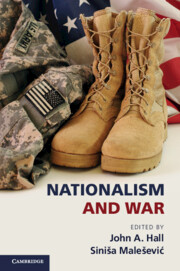Book contents
- Frontmatter
- Contents
- List of figures
- List of tables
- Notes on contributors
- Introduction
- Part 1 Fighting for the nation?
- Part 2 The varieties of nationalist experience
- Part 3 Empires and nation-states
- Part 4 Empty shells, changed conditions
- 11 Internal wars and Latin American nationalism
- 12 War and nationalism
- 13 Victory in defeat?
- 14 When nationalists disagree
- Index
- References
14 - When nationalists disagree
Who should one hate and kill?
Published online by Cambridge University Press: 05 April 2013
- Frontmatter
- Contents
- List of figures
- List of tables
- Notes on contributors
- Introduction
- Part 1 Fighting for the nation?
- Part 2 The varieties of nationalist experience
- Part 3 Empires and nation-states
- Part 4 Empty shells, changed conditions
- 11 Internal wars and Latin American nationalism
- 12 War and nationalism
- 13 Victory in defeat?
- 14 When nationalists disagree
- Index
- References
Summary
Events in the 1990s in the Balkans, Central Africa, and elsewhere not only energized the scholarship of ethnic conflict and nationalism, but also brought the word “nationalist” into the mainstream media. The media defined the bad guys in these conflicts as “nationalists,” which ultimately proved to be less than helpful. After all, to many people, Slobodan Milosevic was not the most extreme Serb nationalist, if he was even a true believer at all. Indeed, he posed as a moderate nationalist when running in elections, juxtaposing himself with Serbs who seemed to be more passionate defenders of the Serb nation. The problem with this kind of discussion is that it suggests that each nation has a simple political spectrum with one end defined as least nationalist and the other as most nationalist.
Each nationalism is actually more complex than that, consisting of a variety of ideas about what the nation is and should be, who the enemies are, and what should be done. It is not simply an issue of less or more, but to which strands one adheres, how one views the various elements, and how they fit together. This is important because it belies the usual equation of more nationalism = more war. The reality is that being a diehard nationalist may actually also make one less inclined towards aggressive foreign policies.
- Type
- Chapter
- Information
- Nationalism and War , pp. 341 - 355Publisher: Cambridge University PressPrint publication year: 2013
References
- 2
- Cited by

